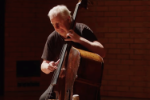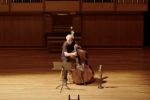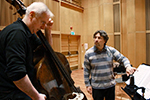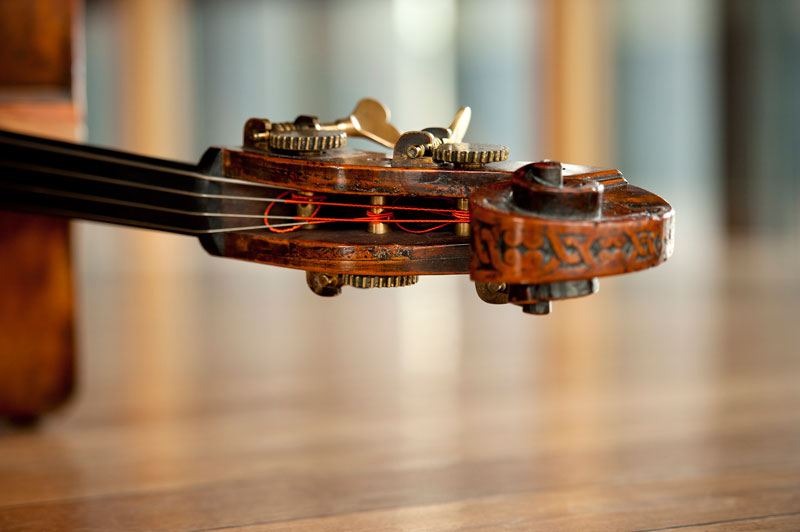Articles
2008
The Strad, August
STYFFE COMMISSIONS EXPLOSIVE DUO
Double bassist Dan Styffe and violinist Catherine Bullock give the first performance of Norwegian composer Ruben Sverre Gjertsen's Duo for double bass and viola on 18 August at the Oslo Chamber Music festival.
Styffe, who commissioned the Duo, admits to 'taking a chance' on the 31-year old composer, but is excited by the result. 'He has a language that is completely his own', said Styffe. 'With this notation I have to look at three or four different lines, one showing the notes, another the rhythm, and another the bowing indications.'
The single-movement work lasts around nine minutes and according to Styffe is both complex and full of contrast. 'Much of it is ppp or pppp, but then there are moments of explosive, very loud music. It has a loose, floating quality but is at times rigidly rhythmical – in that sense it is like a piece of architecture. He pushes the bass to its extremes and uses the combination with viola very effectively.'
For more details, see www.oslokammermusikkfestival.no.
The Strad, October
FRIENDS IN THE NORTH
Swedish composer Fredrik Högberg has written a new concerto for virtuoso double bassist Dan Styffe. Andreas Engström uncovers the story behind the work, which is premiered this month in Oslo.
Double bassist Dan Styffe has enjoyed a multi-faceted carreer. He is co-principal bass in the Oslo Philharmonic Orchestra and principal bass in the Norwegian Chamber Orchestra; he teaches at the Norwegian Academy of Music; and he has appeared as a soloist often in works he has commissioned himself, and has released three solo CDs. More unusually, he began his carreer on the electric bass, plying pop and rock before turning to classical music.Though Styffe was born in Sweden, he has made his professional carreer in Norway, where he still lives.
Born in 1971, Fredrik Högberg is one of Sweden's most innovative composers, with a playful and iconoclastic approach to his craft. For instance, his trombone concerto, the theatrical The Return of Kit Bones, was written for Christian Lindberg and was inspired by Western films. His concerto for double bass and string orchestra is premiered by Styffe and the Norwegian Chamber Orchestra at the Ultima Festival in Oslo, on 7 October.
How did the concerto come about?
Dan Styffe Over the years I have commissioned pieces for double bass, and I am always on the hunt for new somposers. I came across Fredrik's name through some friends. I listened to some of his music and liked what I heard, and then I contacted Fredrik and asked him if he could compose something for the double bass.
What is it about Fredrik's music that attracted you?
DS The rhythm, the swing, the groove. The special way Fredrik integrates rock music. That's also where I came from musically.
Fredrik Högberg I have not worked much with the double bass, so it felt new and exciting. After listening to Dan's CDs I thought we could do something really interesting together.
Is it difficult to use the double bass as a solo instrument with an orchestra? Will the sound actually get through?
DS It really depends upon how the composer distributes the sound in the composition. It might be a problem if you use a large symphony orchestra, but you can still split it up in sections. It is also very important how the composer uses the orchestration.
How are you handling the double bass with this new concerto?
FH From the beginning, I wanted a string orchestra with double basses. This orchestra, the Norwegian Chamber Orchestra, is one in which Dan usually plays, and I saw no reason to change this situation.We are simply turning the orchestra round, so instead of being in the rear, Dan is standing in the front. The idea is that the sound of the solo bass should come from within the orchestra. Using only string players makes this possible.
Can you tell us how you work together?
DS Fredrik visited me in Oslo for a couple of days at Easter. Now we are meeting for the second time, and we will probably meet a few more times to try out ideas.
FH In a way, I am applying my music to Dan and his instrument, but I am also learning from Dan's technical and musical skills.
DS Once, in Oslo, he asked me to just play things I was working on at the time...
FH... and from these kind of experiences I refine my own craft in composing for the double bass.
Can you give an example of this?
FH With a virtuoso like Dan, there's the possibility of using a lot of techniques that do not exist – that is, they are not found in books. Today, for instance, we were talking about playing col legno through the hair, something I had never thought of before.
DS Other bassists might use percussive effects and build their performance around that. My way of approaching the instrument is in that respect relatively traditional.
FH That suits my music very well, since I am very interested in pitches and rhythm. The work will be relatively consonant with a lot of pulses and swing.
Is the choice of instrument important for you as a composer, Fredrik?
FH The person is much more important. I would have been interested in writing for Dan whatever instrument he played. The instrument is a tool. The person makes the music. Yo get to know the double bass is in the end about technique. To get to know Dan is more important.
DS Composers work very differently in this respect. Sometimes I receive a finished score without having had any contact during the process. I believe that most of us who play prefer the kind of contact I have with Fredrik.
FH It is all about aesthetic synchronisation. It is smart to work closely with the musician, because we can both be sure that we are satisfied in the end. But I know composers who would not contact performers at such an early stage, because they might feel stressed and feel there's pressure on them, and I can understand that, too.
Fredrik, you havecomposed several pieces with visual or theatrical effects.
Is this something you will do for this concert?
FH I have more or less put that behind me. But there are certain visual components in this concert. The double bass is a very physical instrument. The kind of virtuosity that we are using works in it self as a visual parameter.
DS I was aware of Fredrik's interest in visual effects. But when I contacted him, I asked him not to use any extra non-musical components. I believe that the music will be interesting in itself.
What makes the solo concerto form so interesting?
FH The answer to your question has to do with the person behind the instrument.
DS But it is also because you want to write a piece that eventually will be played by other musicians.
FH Yes, it is important that pieces for double bass are written. Hopefully this piece will gain a life of its own.
Dan, is there much music written for the double bass today?
DS Yes, there seems to be a greater interest in the instrument these days.
Why is that? There seem to be many double bassists who are working in an interesting area somewhere between classical music, contemporary music, jazz and improvisation.
DS Yes, young musicians in Norway are attracted to many things, and they might not be satisfied with 'only' a position in an orchestra any more. As a teacher at the Norwegian Academy of Music in Oslo, I try to offer as broad an education as possible. In recent years, we've had bassist Håkon Thelin, among others, connected with the academy as an improviser, and Bjørn Kjellemyr teaches jazz. All of this helps make the climate more broad and open.
FH from the composer's point of wiev, if you work with a person who has a passion for their instrument, the chances are that you'll get a great performance. When writing for a symphony orchestra alone, the composer and the piece are just one of several in the performance.
DS I teach, I am principal bassist in the Oslo Philharmonic and in the Norwegian Chamber Orchestra, and I record CDs and play at festivals. There will always be bassists who are very specialised and do their thing, and this is the way it should be. I believe that many musicians of the future will work in many contexts.
Fredrik, you have composed many works in traditional forms, yet you seem to have a rather open attitude towards styles and genres.
FH While I was studying, I realised that I worked with one type of music at school and listened to another type of music at home, which I felt I had to connect to my own music. In my compositions this connection manfests itself, for example, in a stream of semiquavers and a kind of syncopation that could be traced to Depeche Mode and Kraftwerk. Reaching out to the audience is important to me. It is fantastic if I can be a gateway into this small world called art-music.
Dan asked you to write a second version of the concerto for double bass and tape. What is the idea behind that?
FH I often make different versions of my pieces. It is a question of making it possible to perform the music in different contexts. I do not consider my works sacred. I have often rearranged, extended or (more commonly) shortened them.
Sometimes you rearrange your music for visual purposes.
FH The visual aspect of performance interests me because it has not been explored fully. You have a person who plays the instrument and does nothing else. Today, we are used to consuming music with our ears, our eyes, with all our senses. Since economics are important, even in the classical tradition, it is strange that we don't take it for granted that a new piece should be promoted with a video. We must learn to market our music.
How will this concerto be marketed? With your 'desktop artist' concept?
FH Yes, Dan is going to be part of the first prototype for this software. This in combination with the tape version and a kind of video, will be used in the marketing of the concert.
Can you explain the concept a bit more?
FH Classical music does not sell that well, so it is impossible for record companies to do videos, which might cost as much as the recording itself. But then you have lost a large potential audience. With 'desktop artist', for a few hundred Swedish kroner (£10-20) you can put a visual performance on the internet. This is an alternative to music video and an easy way to market a new record, concert or tour.
Are we seeing the beginning of an era in which classical music can work in the same way as popular music?
FH I think so. With new technology and no geographical boundaries, the target audience is unbelievably larger. Classical music has to take part in this development, also because the internet will only go in the direction that those involved make it go.
DS This is something totally new for me. I have taken part in the composition process, rehearsed and recorded. But to think in terms of visuals and marketing is new.
Is this an aspect of what Fredrik calls 'borderless composing'?
FH Yes. To a certain extent, a composer today has to 'give up' composing. That process is just one of several creative acts. Composing today means so many things and involves so many different processes.
Dan, you are a Swedish citizen living in Norway. Where is your professional base?
DS I have played with many Norwegian musicians, such as cellist Øystein Birkeland, pianist Gonzalo Moreno, violinist Atle Sponberg and the Vertavo Quartet. I have also worked with many Norwegian composers, including Jon Øivind Ness, Henrik Hellstenius, Gisle Kverndokk and John Persen. I have performed in various festivals in Sweden and around Europe, but Norway remains my base. my Swedish citizenship sometimes causes problems – for example with fund-raising, if I want to work with a Swedish composer. But in this instance with Fredreik, it went smoothly.
FH Also in Sweden there are rules that sometimes make it difficult for foreign composers to get money for commissions. Still, in the last few years, my music has been performed more often in Norway than in Sweden. I have worked frequently with Norwegian orchestras and musicians, such as Ole Edvard Antonsen, Øystein Baadsvik, Øyvind Farmen and Bit2o. Norway is indeed an attractive country for a composer to work in.
DS Yes, the organisation Ny Musikk is very active at the moment. There has been a boom for classical and contemporary music in the last 10 to 15 years. And the Ultima Festival in Oslo meant a lot to musicians, audiences and the media.
FH New music is more appreciated in Norway than in Sweden. The media covers it, and as a composer you have another kind of status when working with the orchestras. In Sweden, classical music is marginalised in education as well as in radio and television. Classical music is considered alternative music, while pop and rock music are the established forms.
DS In Norway, the municipal music school has meant a lot for general music education. There is also a tradition of military brass bands in Norway that has been important over the years in the forming of musicians. Every little village in Norway has its own wind band. This in conjunction with the marketing of classical and contemporary music in recent decades has resulted in a new generation that makes its own way to concerts.
FH In the region where I live there used to be a strong tradition of wind bands. Today, there is not even one band left.
Dan, you live in Oslo, the Norwegian capital. Fredrik, you live in a small town, not even a town, here in a sparsely populated part or mid-Sweden. Still, living and working in this former theatre and courthouse here in Nyland, with a recording studio, concert hall and a festival, you seem to have established something like a centre for new music.
FH My idea is to attract people to work with and enjoy music here. There are great distances and few people. But I believe that you should not worry too much about what kind of interest there might be. You simply have to create the interest yourself.






